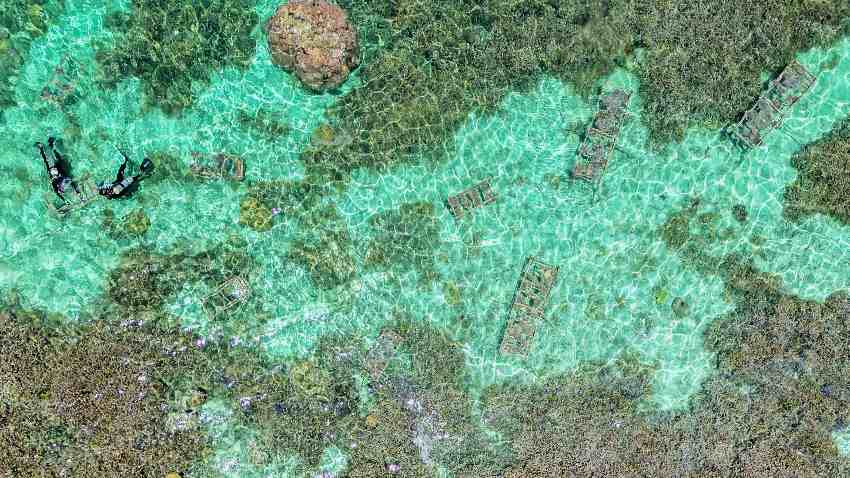A groundbreaking study reveals that selective breeding can improve coral resilience to rising ocean temperatures, offering a potential tool to combat climate change impacts on reefs.
Summary: Researchers have successfully bred corals with increased heat tolerance, demonstrating the viability of selective breeding as a conservation strategy for threatened coral reefs.
Estimated reading time: 4 minutes
Scientists at Newcastle University’s Coralassist Lab have achieved a world first: selectively breeding adult corals for enhanced heat tolerance. The study, published in Nature Communications, shows that it is possible to improve coral offspring’s ability to withstand intense marine heatwaves through selective breeding, even within a single generation.
A Modest but Significant Improvement
The research, conducted over five years and led by Dr. James Guest, demonstrated that selective breeding could lead to a modest increase in coral heat tolerance. However, the scientists caution that this improvement may not be sufficient to keep pace with the rapid ocean warming projected under climate change scenarios.
Liam Lachs, the study’s lead author and a Postdoctoral Research Associate at Newcastle University, emphasized the need for a multi-faceted approach: “This work shows that selective breeding is feasible but not a silver bullet solution and that more research is needed to maximise breeding outcomes. In parallel, rapid reductions of global greenhouse gas emissions are an absolute requirement to mitigate warming and give corals an opportunity to adapt.”
The Breeding Process and Results
The research team conducted selective breeding trials focusing on two different traits:
- Tolerance to a short, intense heat exposure (10 days, reaching +3.5°C)
- Tolerance to a less-intense but long-term exposure more typical of natural marine heatwaves (1 month, reaching +2.5°C)
The results showed that selecting parent colonies for high heat tolerance increased the tolerance of adult offspring for both short-term and long-term exposures. Theoretically, heat tolerance could be enhanced by approximately 1 °C-week within a single generation.
However, Dr. Guest cautioned about the limitations of the current findings: “Given the moderate levels of enhancement we achieved in this study the effectiveness of such interventions will also depend on urgent climate action.”
Challenges and Future Directions
The study revealed a potentially significant challenge: breeding for short-term stress tolerance did not necessarily improve offspring’s ability to survive long-term heat stress. This suggests that these traits might be under independent genetic control, which could complicate breeding efforts aimed at enhancing overall heat resilience.
Dr. Adriana Humanes, a Postdoctoral Research Associate at the Coralassist Lab, highlighted the need for further research: “Considerable work remains before selective breeding can be successfully implemented. A deeper understanding is needed to determine which traits to prioritize and how these traits are genetically correlated.”
The researchers emphasize that while this study proves the concept of selective breeding for heat tolerance in corals, significant work remains to operationalize and maximize the outcomes of such interventions.
The Broader Context
Coral reefs are at the forefront of climate change impacts, with reef-building corals being highly sensitive to marine heatwaves. These events can trigger mass coral bleaching and mortality, leading to substantial reef declines globally. The successful breeding of more heat-tolerant corals offers a potential tool in the arsenal of conservation strategies aimed at preserving these crucial marine ecosystems.
However, the authors stress that selective breeding should not be viewed as a standalone solution. It must be part of a comprehensive approach that includes urgent action to reduce greenhouse gas emissions and mitigate global warming.
Glossary of Terms
- Selective breeding: The process of intentionally selecting organisms with desired traits to produce offspring with those characteristics.
- Heat tolerance: The ability of an organism to survive and function under higher-than-normal temperatures.
- Marine heatwave: An extended period of abnormally high ocean temperatures.
- Coral bleaching: A stress response in corals where they expel their symbiotic algae, often due to high water temperatures.
- Genetic correlation: The degree to which genetic factors influence two or more traits simultaneously.
Quiz: Test Your Understanding
- What was the maximum theoretical enhancement in heat tolerance achieved in a single generation of selective breeding?
- Did breeding for short-term stress tolerance improve offspring’s ability to survive long-term heat stress?
- According to the researchers, what is an “absolute requirement” alongside selective breeding efforts?
Answers:
- Approximately 1 °C-week
- No, there was no evidence of this
- Rapid reductions of global greenhouse gas emissions
For more information, read the full study in Nature Communications: https://doi.org/10.1038/s41467-024-52895-1
Enjoy this story? Get our newsletter! https://scienceblog.substack.com/


